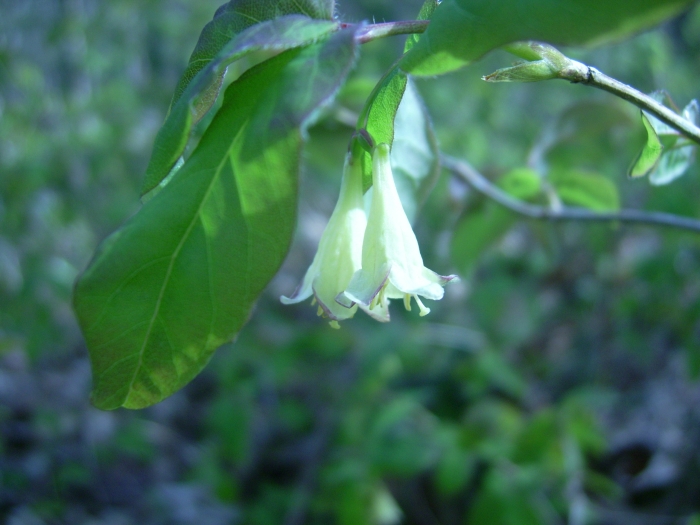American Fly Honeysuckle
(Lonicera canadensis)
American Fly Honeysuckle (Lonicera canadensis)
/
/

Fungus Guy
CC BY-SA 3.0
Image By:
Fungus Guy
Recorded By:
Copyright:
CC BY-SA 3.0
Copyright Notice:
Photo by: Fungus Guy | License Type: CC BY-SA 3.0 | License URL: https://creativecommons.org/licenses/by-sa/3.0 | Uploader: Fungus Guy | Publisher: Wikimedia Commons | Title: Fly_honeysuckle_(Whitefish_I)_1.JPG | Notes: |
















































Estimated Native Range
Summary
Lonicera canadensis, commonly known as American Fly Honeysuckle, is a deciduous perennial shrub native to cool, moist, deciduous and mixed forests in the Eastern United States and Eastern Canada. It typically grows 1–2 m (3 ft 3 in – 6 ft 7 in) tall and is known for its graceful, arching branches. The shrub produces pairs of yellowish to creamy white flowers from late April to late May, which are modest in appearance but can be quite fragrant. Following the flowering period, small red berries emerge, ripening from June to August, and are sometimes eaten by birds.
American Fly Honeysuckle is valued for its ability to thrive in shaded conditions, making it suitable for woodland gardens, naturalized areas, and shaded borders. Its preference for cool, moist environments means it is less suited to hot, dry climates. Gardeners appreciate its ease of maintenance and the subtle beauty it adds to the understory. It requires medium amounts of water and does best in soils with medium drainage, avoiding overly wet or dry extremes. While not prone to serious pest or disease problems, powdery mildew and honeysuckle aphids can occasionally affect the plant. It is not known for aggressive roots or invasiveness, but it is advisable to monitor its spread in favorable conditions.CC BY-SA 4.0
American Fly Honeysuckle is valued for its ability to thrive in shaded conditions, making it suitable for woodland gardens, naturalized areas, and shaded borders. Its preference for cool, moist environments means it is less suited to hot, dry climates. Gardeners appreciate its ease of maintenance and the subtle beauty it adds to the understory. It requires medium amounts of water and does best in soils with medium drainage, avoiding overly wet or dry extremes. While not prone to serious pest or disease problems, powdery mildew and honeysuckle aphids can occasionally affect the plant. It is not known for aggressive roots or invasiveness, but it is advisable to monitor its spread in favorable conditions.CC BY-SA 4.0
Plant Description
- Plant Type: Shrub
- Height: 2-6 feet
- Width: 2-4 feet
- Growth Rate: Moderate
- Flower Color: Yellow, Cream
- Flowering Season: Spring, Summer
- Leaf Retention: Deciduous
Growth Requirements
- Sun: Part Shade, Full Shade
- Water: Medium
- Drainage: Medium
Common Uses
Bee Garden, Bird Garden, Butterfly Garden, Fragrant, Hummingbird Garden, Low Maintenance
Natural Habitat
Cool, moist, deciduous and mixed forests
Other Names
Common Names: Fly Honeysuckle, Canadian Fly Honeysuckle, American Fly-Honeysuckle
Scientific Names: , Lonicera canadensis, Caprifolium ciliatum, Lonicera ciliata var. alba, Vitis-idaea alba, Xylosteon ciliatum, Xylosteon ciliatum var. album,
GBIF Accepted Name: Lonicera canadensis Bartram ex Marshall